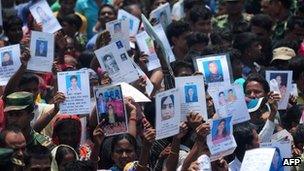Bangladesh collapse: Thousands hold prayers for victims
- Published
Sanjoy Majumder reports from the site of the Rana Plaza in Dhaka
Thousands of mourners in Bangladesh have held prayers for more than 1,100 people who died when a garment factory building collapsed last month.
The mourners in Savar, near the capital Dhaka, were joined by relatives of some 100 people who are still missing.
The army had earlier ended its search for bodies and handed the site to the local authorities to clear up.
Meanwhile, some major world retailers have backed plans to improve the safety of Bangladesh's clothing factories.
The deal requires them to conduct safety inspections and pay for repairs.

Many in the crowd held pictures of their missing relatives
Asking for salvation
On Tuesday, large crowds gathered in Savar to mourn the victims of the collapse - Bangladesh's worst industrial tragedy.
Soldiers, police and firefighters stood solemnly together with relatives of the victims during the Islamic prayer service.
They raised their cupped hands to ask for the salvation of those who died when the eight-storey Rana Plaza building came crashing down on 24 April.
At least 1,127 people died when the eight-storey Rana Plaza collapsed on 24 April.
The collapse is the latest in a series of deadly incidents that have focused global attention on safety standards in Bangladesh's export garment industry, which is the second biggest after China's.
Hundreds of factories have been forced to close by recurrent worker unrest sparked by the disaster, officials say.
The government has since announced steps aimed at improving conditions. That includes raising the minimum wage for industry workers and making it easier for them to form unions.
Deal deadline
Meanwhile, some European fashion retailers - including Hennes & Mauritz and Inditex, which owns Zara - have signed up to the legally binding agreement called the Accord on Fire and Building Safety in Bangladesh.
The deal includes regulations on safety inspections and requires retailers to pay for factory repairs.
Two labour groups are behind the pact and the deadline for retailers to sign on is 15 May.
Discount clothing company Primark and UK supermarket chain Tesco have also signed the agreement.
About 60% of Bangladesh's garment exports go to European retailers.
However, major US firms including Gap Inc, Walmart and Sears have said they will not sign the agreement, throwing its impact into question.
US retailer Gap said it would only sign the accord if changes were made to rules on how disputes were resolved.